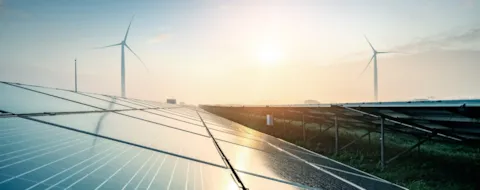Reflections on renewable energy in the Middle East
Experience, devotion to continual improvement through feedback loops and an appetite for innovation are the key characteristics that distinguish the leading companies from the rest.
Now that the dust (or should I say sand?) has settled after the World Future Energy Summit (WFES) in Abu Dhabi, it is probably a good time to reflect on some of the dynamics affecting the renewable energy market in the region. Although the Middle East’s culture is ancient and its technical achievements have matched and even outshone those of other regions for long periods (e.g. adopting the use of wind power both for production and in architectural design in ways very advanced for their time), in respect to renewables, the region is still in its infancy.
It was obvious at the conference that there’s an appetite for more renewables and great optimism; this is now somewhat lacking in many more developed markets in Europe and the Americas. Although a relative latecomer to the renewable energy party, the region has the advantage of being able to leverage the experience of more developed markets and benefit from their cost reductions and efficiencies. The Middle East region has also developed national champions that have an international portfolio, such as Masdar’s stake in the London Array wind farm.
It is exactly this “transferred-in” experience that has meant that the region is leading the way in renewable energy-generated electricity pricing, with some of the lowest solar bids seen so far globally, happening in quick succession in regional auctions. However, it is vitally important not to make this a foreign company-run exercise! Sure, international companies have a vital role to play, especially in the early stages of the renewable energy market’s growth where they can bring their international experience to bear, but not developing local capabilities directly (e.g. knowledge transfer initiatives) or allowing them to develop naturally (local supply chains) would be a massive missed opportunity for the all the countries in the region that are now taking their first steps to decarbonization.
It is also normal and even desirable for regional stakeholders to want to demonstrate that they can do everything bigger, faster and cheaper than anywhere else in the world. For this to happen sustainably, the credentials of the stakeholders involved in the project delivery need to be class leading. Especially in the case of external assistance (e.g. consultants of any type), there is usually a correlation between the level of stakeholder capabilities and the price clients must pay for accessing those skills. It is important to educate owners and financiers all over the world on the importance of high-quality due diligence with respect to resource assessments and expected energy yield performance.
The need for this experience is especially acute in the initial steps of a project’s development. Although in many minds, development services (like for instance measurement campaign specifications or energy yield assessments) have become “commoditized”, given the importance of the initial production estimates (P50/P90) on the whole project lifecycle, it would be a mistake to assume that all services are created equal! Although extensive in-region references are hard to demonstrate due to the nascent nature of the renewable energy market, a strong delivery track record in other developing markets is a useful proxy. But that is not enough on its own; even DNV with a track record of hundreds of GW globally and over 5GW of wind and solar assessed in the region, is considered relatively unknown in some areas, as I discovered at WFES! Nevertheless, the onus is on us as a company to employ our experts close to our customers for better proximity and awareness.
Experience, devotion to continual improvement through feedback loops and an appetite for innovation are the key characteristics that distinguish the leading companies from the rest (this holds true both for the developers themselves but more importantly the advisors they hire!). To facilitate this, we as a company must be close to our customers.
Of course, in markets where a “build it/flip it” business model is prevalent, this “cost-benefit” scenario is hard to sell to developers who will ultimately not be owning the assets long-term. But if the region really wants to be at the forefront of renewable energy development and integration, then long-term, sustainable, integrated thinking will need to extend beyond just getting more renewable energy into the ground, to financing, developing and ultimately operating those renewable energy projects as well!
2/11/2020 5:00:00 AM
